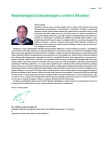-
Medical journals
- Career
Granulocytopenia
Authors: Jaroslav Čermák 1,2
Authors‘ workplace: Ústav klinické a experimentální hematologie 1. LF UK, Praha 1; Ústav hematologie a krevní transfuze, Praha 2
Published in: Vnitř Lék 2018; 64(5): 520-525
Category:
Overview
Granulocytopenia is defined as a decrease of peripheral blood granulocytes below lower limit of normal range. Patients with severe granulocytopenia – agranulocytosis exhibit < 0.5 × 109/l granulocytes in peipheral blood. Granulocytopenia may result from congenital or acquired defective production of granulocyte precursors or it may be a consequence of increased destruction of mature granulocytes, most frequently caused by immune mechanisms. Investigation of origin of granulocytopenia must be connected with exclusion of etiological agents causing secondary neutropenia (infections, autoimmune disorders, drugs, LGL syndrome). Patients with > 0.5 × 109/l of granulocytes usually do not exhibit clinical symptoms unless they do not suffer from a concomitant disease (especially immunodeficiency). Patients with severe granulocytopenia are indicated for supportive treatment and for administration of G-CSF. Children with severe congenital neutropenia (SCN) are at risk of later development of MDS or AML and are candidates for SCT when signs of disease progression appears.
Key words:
diagnosis – granulocytopenia – growth factors – pathogenesis – transplantation –treatment
Sources
- Palmblad J, Dufour C, Papadaki H. How we diagnose neutropenia in the adult and elderly patient. Haematologica 2014; 99(7): 1130–1133. Dostupné z DOI: <http://dx.oi.org/dx.doi.org/10.3324/haematol.2014.110288>.
- Horwitz MS, Corey SJ, Grimes HL et al. ELANE mutations in cyclic and severe congenital neutropenia: genetics and pathophysiology. Hematol Oncol Clin North Am 2013; 27 : 19–41. vii. Dostupné z DOI: <http://dx.doi.org/10.1016/j.hoc.2012.10.004>.
- Zeidler C, Welte K. Kostmann syndrome and severe congenital neutropenia. Semin Hematol 2002; 39(2): 82–88.
- Smith OP. Shwachman-Diamond syndrome. Semin Hematol 2002; 39(2): 95–102.
- Freedman M, Alter BP. Risk of myelodysplastic syndrome and acute myeloid leukemia in congenital neutropenias. Semin Hematol 2002; 39(2): 128–133.
- Cham B, Bonilla MA, Winkelstein J. Neutropenia associated with primary immunodeficiency syndromes. Semin Hematol 2002; 39(2): 107–112.
- Papadaki H, Eliopoulos AG, Kosteas T et al. Impaired granulocytopoiesis in patients with chronic idiopathic neutropenia is associated with increased apoptosis of bone marrow myeloid progenitor cells. Blood 2003; 101(7): 2591–2600. Dostupné z DOI: <http://dx.doi.org/10.1182/blood-2002–09–2898>.
- Palmblad JEW, von dem Borne AE. Idiopathic, immune, infectious, and idiosyncratic neutropenias. Semin Hematol 2002; 39(2): 113–120.
- Newburger PE, Dale DC. Evaluation and management of patients with isolated neutropenia. Semin Hematol 2013; 50(3): 198–206. Dostupné z DOI: <http://dx.doi.org/10.1053/j.seminhematol.2013.06.010>.
- Gibson C, Berliner N. How we evaluate and treat neutropenia in adults. Blood 2014; 124 : 1251–1258; quiz 1378. Dostupné z DOI: <http://dx.doi.org/10.1182/blood-2014–02–482612>.
- Touw IP. Game of clones: the genomic evolution of severe congenital neutropenia. Hematology Am Soc Hematol Educ Program 2015; 2015 : 1–7. Dostupné z DOI: <http://dx.doi.org/10.1182/asheducation-2015.1.1>.
- Rosenberg PS, Zeidler C, Bolyard AA et al. Stable long-term risk of leukaemia in patients with severe congenital neutropenia maintained on G-CSF therapy. Br J Haematol 2010; 150(2): 196–199. Dostupné z DOI: <http://dx.doi.org/10.1111/j.1365–2141.2010.08216.x>.
- Germeshausen M, Ballmaier M, Welte K. Incidence of CSF3R mutations in severe congenital neutropenia and relevance for leukemogenesis: results of a long-term study. Blood 2007; 109(1): 93–99. Dostupné z DOI: <http://dx.doi.org/10.1182/blood-2006–02–004275>.
- Skokowa J, Steinemann D, Katsman-Kuipers H et al. Cooperativity of RUNX1 and CSF3R mutations in severe congenital neutropenia: a unique pathway in myeloid leukemogenesis. Blood 2014; 123(14): 2229–2237. Dostupné z DOI: <http://dx.doi.org/10.1182/blood-2013–11–538025>.
- Starkebaum G. Chronic neutropenia associated with autoimmune disease. Semin Hematol 2002; 39(2): 121–127.
- Zhang D, Loughran TP Jr. Large granular lymphocytic leukemia: molecular pathogenesis, clinical manifestations, and treatment. Hematology Am Soc Hematol Educ Program 2012; 2012 : 652–659. Dostupné z DOI: <http://dx.doi.org/10.1182/asheducation-2012.1.652>.
Labels
Diabetology Endocrinology Internal medicine
Article was published inInternal Medicine

2018 Issue 5-
All articles in this issue
- Differential diagnosis of anemia
- Hemoglobinopathies
- Rare anemias from the group of congenital bone marrow failure syndromes
- Aplastic anemia
- Paroxysmal nocturnal hemoglobinuria
- Autoimmune hemolytic anemia
- Granulocytopenia
- Diagnosis and treatment of immune thrombocytopenia
- Hematopoietic stem cell transplantation for non-malignant hematological disorders
- Diagnostic strategies in disorders of hemostasis
- Congenital and acquired bleeding disorders
- Investigation of congenital thrombophilic conditions: when, in whom, focusing on what or not at all?
- Antithrombotics today
- Internal Medicine
- Journal archive
- Current issue
- Online only
- About the journal
Most read in this issue- Autoimmune hemolytic anemia
- Differential diagnosis of anemia
- Congenital and acquired bleeding disorders
- Hemoglobinopathies
Login#ADS_BOTTOM_SCRIPTS#Forgotten passwordEnter the email address that you registered with. We will send you instructions on how to set a new password.
- Career

